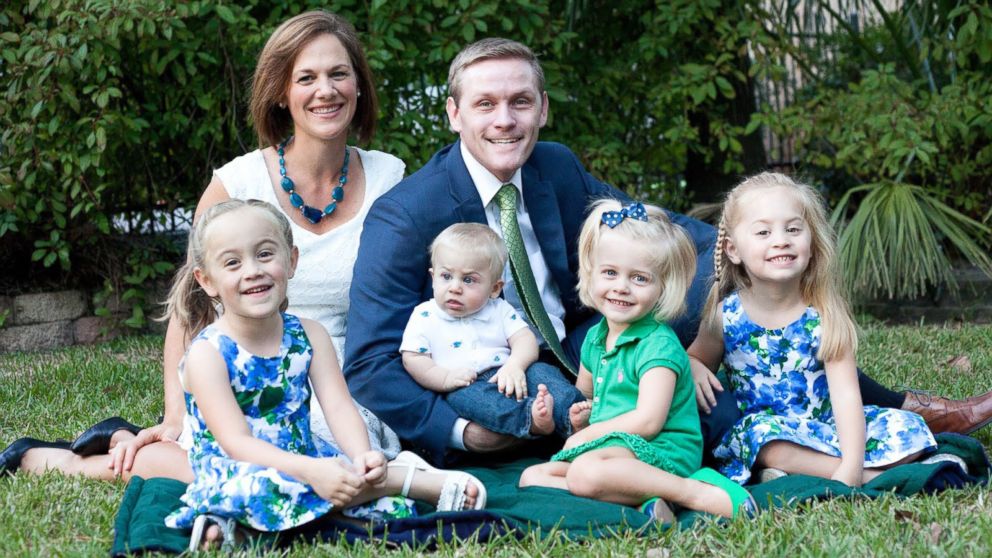Siblings with same rare birth defect like being 'struck twice by lightning'
Texas family had two children with their skull fused at birth.

— -- When Christa and Rob Ellis welcomed their fourth child into the world, they were astounded to see a small ridge along their son's forehead. A similar ridge was found on their oldest daughter's forehead when she was born, a sign that she had a rare genetic condition called metopic craniosynostosis.
The condition is characterized by a fusing of the front part of the skull along the forehead. Without treatment the fused skull can result in brain damage as the child grows. The brain can be compressed or be put under increased pressure if the skull does not expand.
While other versions of craniosynostosis, where different parts of the skull are fused, can be due to genetic mutations shared by a family, in this case the condition happens spontaneously meaning it is was not more likely to occur in a single family.
“It’s like getting struck by lightning – twice," Ellis said in a statement released by Children’s Memorial Hermann Hospital.
The couple's oldest daughter Savannah was born with the condition in 2011. It is estimated to occur 1 in 2,000 births, according to Dr. Matthew Greives, pediatric craniofacial surgeon at Children’s Memorial Hermann Hospital and University of Texas Health.
"There's been case reports of one or two twins having it or siblings," Greives told ABC News. But "it's rare enough that single instance [of siblings] like this is reportable in the literature."
She underwent surgery at 7 months to completely reshape her forehead. It was a daunting surgery called “cranial vault remodeling" that required surgeons to essentially break and reform the skull over seven hours.
"It's pretty gruesome," Ellis told ABC News of her daughter's surgery. While the surgery was a success, it took a toll on the tiny patient.
"It took 6 to 8 weeks before I felt like until she was back to her happy self," said Ellis. "She'd wake up with night terrors...and the surgeon said that it was pretty common."
With Savannah and her twin sister Lily now 5, the Ellis family thought they were mostly done dealing with the rare disorder. But when Ellis and her husband saw their youngest child Stanley, she said they instantly knew something was wrong.
"It was hard in the delivery room just kind of feeling that weight settle on me, saying I know this journey," she said.
Ellis said she and her husband reached out to the specialists almost immediately at Children’s Memorial Hermann Hospital confirm the diagnosis. She worked with Greives and was surprised to discover there was another slightly less invasive option for Stanley.
The doctors could use endoscopic tools and a helmet to reform the infant's skull.
"Before they're 5 months old the bone is still soft enough they can do the endoscopic surgery," said Ellis.
Greives explained they are able to separate the skull using tools that require only small incisions. They are able to separate the skull where it was naturally supposed to separate without going through the full procedure that older children are put through. As the bone begins to take shape and harden, the infant wears a helmet to help the skull keep the correct shape. It's a far less invasive surgery than the one Savannah went through.
Ellis said the second time she had a child have their forehead reshaped it was far easier. Rather than an hours-long surgery, the new procedure can take under an hour. Ellis said Stanley only had to be in the hospital for about one day after his surgery and quickly bounced back.
"The following day he didn't need any pain medication at all...that was a much better experience for us," she said.
Now 5 months after the surgery, Stanley is almost done with his treatment to reshape his skull with helmets. Both he and his sister will be monitored carefully by Grieves and their other doctors to ensure there is enough room for their growing brains.
The family is also taking part as research subjects so doctors can better understand how and why this condition develops in a fetus.
"It's so rare they don't even have the statistics," said Christa Ellis. "It's like well, 'Congratulations you're one in a million,' This is not the prize I want to be winning.'"




